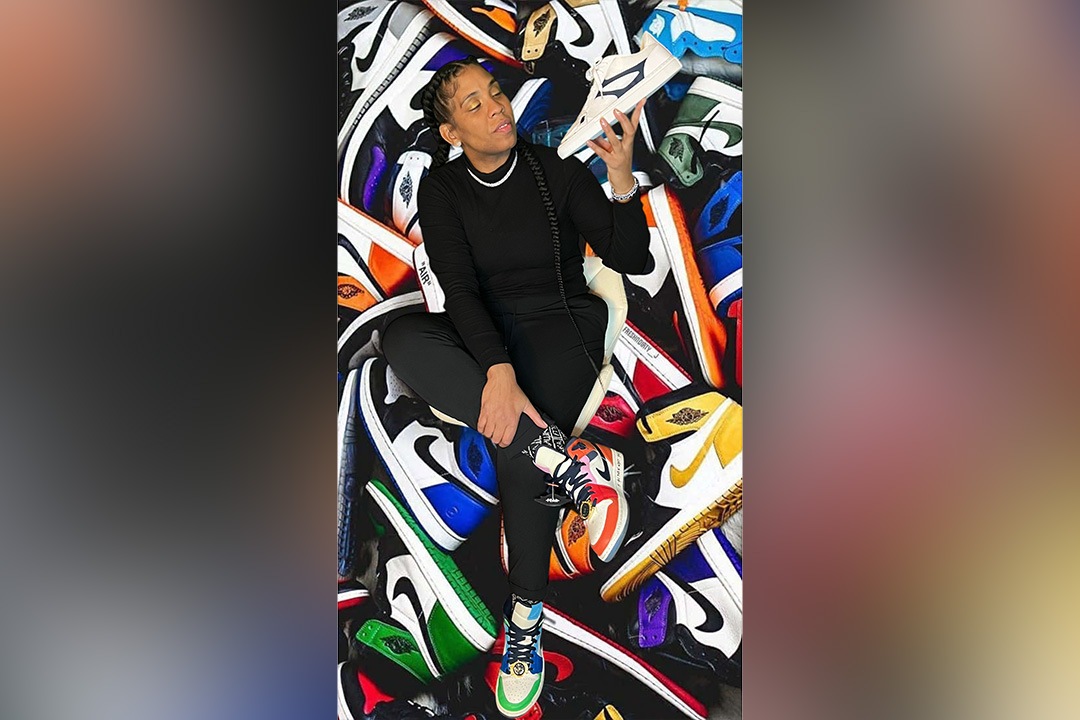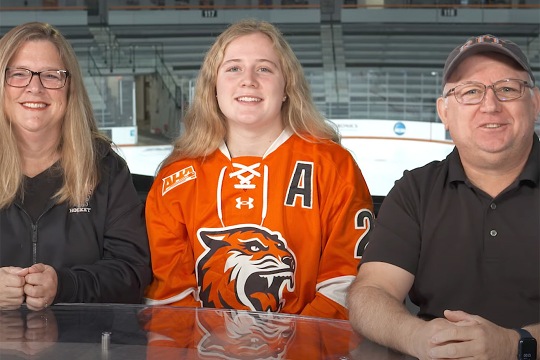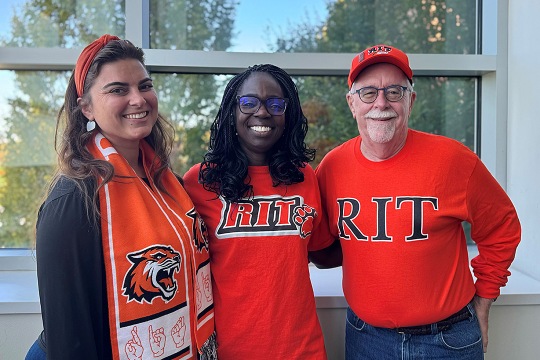NTID AlumniNews
RIT/NTID alumna finds success in the footwear industry through determination and persistence

Ebony Watson ’04 (applied computer technology) shattered accessibility barriers in the footwear industry, becoming the first deaf footwear designer to earn recognition for her work. Watson has loved footwear since childhood, but she says her journey into fashion was far from easy.
From a young age, Watson had an interest in computer engineering as well as art and design. When it was time for college, she chose RIT/NTID to major in applied computer technology with a minor in fine arts that provided her with the technical skills and expertise needed for creative roles in art, design, and technology.
After earning an applied associate degree from RIT/NTID, Watson began her career in the technology field, working for Apple as a technical specialist and software engineering project manager. In addition to her 9-to-5 job, Watson is a footwear designer, creating, designing, and building her own footwear from scratch.
As Watson entered the footwear industry, she faced challenges in receiving accommodations such as sign language interpreters. However, her determination and persistence for success in creating shoe designs has generated the attention of industry leaders and earned her the Footwear Creators Scholarship Award by Foot Locker.
An enthusiastic footwear designer with the hope of eliminating communication barriers and providing accommodations for creative individuals, Watson plans to launch the “Sigue Tu Alma” program this year to inspire aspiring designers to pursue their dreams and teach deaf and hard-of-hearing individuals how to design footwear and apparel.
What made you interested in becoming a footwear designer?
I have always been interested in footwear, especially sneakers, since I was about 7 or 8 years old. That’s the age I picked up a basketball and watched other players play the sport I love. I studied their body language, movements, and style of clothing, and the cherry on top was what shoes they wore. It was the first thing I looked at, and I admired the design and technique of the shoe itself. It also defined status. Back in my day, Reeboks, Adidas, and Pumas were the wave. Adidas was on the map in the 80s before Nike came into the picture. I wore shell toes, Reebok Shaq Attaq, Dee Brown’s Reeboks with the big orange pump – these shoes were my style and comfort playing basketball back then. I always loved footwear. It’s like a stamp of who you are becoming or what you already are.
Describe the challenges you have faced as a deaf/hard-of-hearing individual and how you successfully overcame them while breaking into the footwear industry.
It was not an easy journey for me as a deaf/hard-of-hearing individual in the footwear industry. In order for me to learn how to design footwear, I had to dig deeper to get the attention of different individuals who taught footwear design to actually give me a chance at taking the class with accommodations of a sign language interpreter and other basic accommodations, so I could learn and study just like the other students.
But I received so many “No, I’m sorry we can’t accommodate” responses or no call backs, or I would have to pay for an interpreter out of pocket because interpreters were too expensive for them, or other comments as if I wasn’t important to them as far as inclusion. When I was a little girl, my mother always told me, “If there’s a will, there is a way.” With that said, I continued to find ways to learn how to make a shoe physically. With determination, I designed my first pair of Air Jordan 1s. Then, after that, I designed my second and third pairs. I kept practicing and learning the ins and outs of the craft, wanting to learn more styles and concepts. While learning on my own, I was also networking in the footwear industry. Some people were very welcoming and supportive, while others were dismissive and ignorant.
You received an award for the Footwear Creators Scholarship at Pensole Lewis College of Business and Design with Arsutoria Footwear Creation Studio by Foot Locker. What does that mean to you?
Yes! Oh my! You have no idea. I worked so hard on putting my portfolio together to showcase the work I have done from various materials, the anatomy of the footwear I’ve made, and so forth. It was about 4-5 pages long. And I just did a prayer and submitted it real quick. I just wanted to take the class and show the world what I could do with these creative hands of mine.
It meant so much that when I actually set foot into the classroom, I cried quietly as soon as my instructor and mentor from Wolverine Footwear showed me my own design table with tools and my name on it. Then, when I looked up and saw an ASL Interpreter ready on standby, I hugged her and thanked her! I also saw Dr. Dwayne Edwards, the founder of Pensole Lewis College (PLC), and he opened his arms wide! I hugged him tight and told him thank you. He said, “Congratulations! I’m so glad you are here.” I was just shocked that all of this was real. I had to pinch myself twice when I saw the interpreter; it was a dream come true.
I’m actually here learning how to make footwear from top professors who came from the Arsutoria Workshop School in Italy. I completed a pair of Oxford Sneakers the Italian way! As a result, I received my Certificate of Completion that I will forever cherish and frame on my wall. Now, my next step is to continue to perfect my craft and create my very own footwear line with the goal of going to Milan, Italy, at Arsutoria, taking full-term classes, and meeting my professors there.
Tell me about the “Sigue Tu Alma” program you founded for BIPOC individuals. What led you to start this program?
Sigue Tu Alma means ‘follow your soul,’ (follow your ‘sole’). In other words, follow your footsteps in your journey so you can continue to achieve your goals, dreams and aspirations—keep going. Don’t stop—follow your soul, it knows the way. I started this program to teach other BIPOC deaf and hard-of-hearing creative individuals to unleash the creative abilities within and bring to life their vision and passion, and also to teach them how to design footwear, apparel, etc. with the support of sign language being used in the classroom, because I know what it’s like to be dismissed or told no. So now I want to create rooms with opportunities and accommodations instead of going down the same route I did that didn’t have the accommodations, so I missed out on materials and content being taught.
You graduated with a degree in applied computer technology. How has your education at RIT/NTID helped you prepare for your career?
Having a computer information technology degree has provided me with a solid foundation in tech skills, enhancing my problem-solving abilities, which are crucial at Apple. Meanwhile, my minor in fine arts honed my creativity, which is a valuable asset in my role as a footwear designer, fostering innovative designs and a unique perspective in the industry. The fusion of my information technology background and fine arts minor empowers me to seamlessly blend technical proficiency with creative flair, allowing me to craft enchanting designs in the realm of footwear.
What are your favorite and memorable moments when you were a student at RIT?
Diversity was crucial to me at the time when I was a student at RIT/NTID. So, my favorite memorable time was when I was playing basketball for the RIT women’s basketball team and making friends with the players on the team who looked like me and were able to form a bond on the basketball court. My assistant coach was very supportive and made me feel comfortable playing at RIT. It was a big diversity shift compared to what I was used to.
What advice would you give to RIT/NTID students?
Do not wait for opportunities to be given to you, and do not wait to earn a seat or claim a seat at a table. Instead, create your own table and your own opportunity. Otherwise, you will be waiting your entire life trying to get a seat at someone else’s table. Go get your own table. Go get yours!








